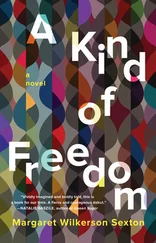Ray Kreisel - A Different Kind of Freedom
Здесь есть возможность читать онлайн «Ray Kreisel - A Different Kind of Freedom» весь текст электронной книги совершенно бесплатно (целиком полную версию без сокращений). В некоторых случаях можно слушать аудио, скачать через торрент в формате fb2 и присутствует краткое содержание. Жанр: Прочие приключения, на английском языке. Описание произведения, (предисловие) а так же отзывы посетителей доступны на портале библиотеки ЛибКат.
- Название:A Different Kind of Freedom
- Автор:
- Жанр:
- Год:неизвестен
- ISBN:нет данных
- Рейтинг книги:4 / 5. Голосов: 1
-
Избранное:Добавить в избранное
- Отзывы:
-
Ваша оценка:
- 80
- 1
- 2
- 3
- 4
- 5
A Different Kind of Freedom: краткое содержание, описание и аннотация
Предлагаем к чтению аннотацию, описание, краткое содержание или предисловие (зависит от того, что написал сам автор книги «A Different Kind of Freedom»). Если вы не нашли необходимую информацию о книге — напишите в комментариях, мы постараемся отыскать её.
My 3300-mile bicycle trip is the subject of the ebook, A Different Kind of Freedom.
A Different Kind of Freedom — читать онлайн бесплатно полную книгу (весь текст) целиком
Ниже представлен текст книги, разбитый по страницам. Система сохранения места последней прочитанной страницы, позволяет с удобством читать онлайн бесплатно книгу «A Different Kind of Freedom», без необходимости каждый раз заново искать на чём Вы остановились. Поставьте закладку, и сможете в любой момент перейти на страницу, на которой закончили чтение.
Интервал:
Закладка:
In most of China, just about all road construction is still done by hand. That means that there are large crews of lower class workers with picks and shovels who actually build the roads, moving dirt and breaking up boulders with steel and muscle. These workers usually live in small bamboo and plastic shacks on the side of the road. In Tibet the workers all come from Sichuan and other Han Chinese provinces where there are more hands than work. They come to Tibet and Xinjiang Province for the summer to make money on a road crew. When winter returns, they retreat to Chengdu, and other warmer locations in central China.
As I approached Rutog, I first rode through the construction camps. The workers on the sides of the road chatted with excitement upon seeing a foreigner in this barren land. Most Chinese think life in far Western Tibet is like some kind of hell devoid of all culture and civilization. They all smiled and waved, a few people yelled out “ni qu nar?” (“You go where?” in Chinese). Only ONE road cuts across far Western Tibet, it continues across the Askin Chin, then on to Xinjiang Province and finally arrives in Kashgar. When I replied, “Kashgar!” there was still a bit of shock on their faces. I knew that most of them must have thought that I was somewhat crazy to be out there to start out with, but to say that I planned to ride my bike to Kashgar confirmed any doubts.
By the time I stopped my bike and got a chance to look around in one of the small shops, a crowd of 30 to 40 people had encircled my bike and me. The Chinese shopkeepers all tried to act calm and cool, like it was no big deal. I am sure that they had all seen many foreigners before in other parts of China. Meanwhile the Tibetan kids buzzed in a wild frenzy, so excited that some strange “inji” had come to visit their town. As I moved from shop to shop looking for jarred fruit and dried noodles, the entire crowd moved with me. Everyone speculated what my water bottles contained, some thought that they held gasoline for my engine, but others thought they held alcohol, maybe to numb the pain of traveling through this harsh land. The bike computer on the handlebars was the other object of great fascination and speculation. When I demonstrated that my bike computer could tell me how many kilometers I had traveled and what the current altitude was it left everyone dumbfounded. After a couple inquiries I discovered the location of the post office. I had learned much earlier that in order to mail anything from remote post offices like this, I should carry my own postcards and stamps. The post office had been closed but because I was a special guest of sorts, they opened it up for me, pushing a six-foot-high [2 meter high] file cabinet out of the way so that we could enter the office. A couple months after my return to the USA, the card that I had mailed from Rutog actually arrived in Seattle. That postcard’s own journey around the planet would have been a tale worth listening to.
It took about an hour and half for the police to find me. These guys did not represent the sharpest law enforcement officers in the world. I had been talking with the owners of a Muslim restaurant when the police walked in with their belts full of small silver bullets. It reminded me of a scene out of a Wild West movie, the only problem being that I had the role of the outlaw on the run from the law. After all I did wear a red bandanna around my neck that I often covered my mouth and nose with, looking like quite the Western outlaw. The two Tibetan policemen asked me in Chinese, “ni de huzhao” (“Your passport”). I switched to my normal play dumb with the police mode, and pretended not to understand what they said. They both talked among themselves in Tibetan, saying a few things about my stupidity, and how I should have special paperwork to be there. Finally after about fifteen minutes of getting nowhere, they started to insist that I accompany them to the police station. This was not something that I wanted to do. I wanted to come to some kind of resolution there in the restaurant. Reluctantly, I pulled out my passport. I heard the head guy say to the other that this was not even a passport. Even Mr. Lee back in Ali had problems reading my passport. Trying to figure out which of my Chinese visas was the most current confused him. Finally I showed them the page in my passport that had my new visa extension from the police in Ali. I knew that they would be able to read the characters for “Ali,” and would therefore know that I had visited Mr. Lee and that he granted me permission to continue my trip. I continued pointing to the stamp from the Ali police, saying the Chinese name for Ali. I hoped that since the Ali office was the regional headquarters they would not be able to question a stamp I had gotten there. Once again, after I managed to tire them out with a certain pretense of stupidity on my part, they decided that I could go on. After all I was headed to Kashgar, the closest legal place for foreigners, even though it was 700 miles away.
In 1948, Lama Govinda and Li Gotami crossed from the Ladakh region of India to the then independent country of Tibet. They described this epic journey to Mt. Kailash in the classic book Way of the White Clouds . Lama Govinda was one of the first Westerners to ever become an ordained Tibetan Buddhist Lama and bring some of the teachings of Tibetan Buddhism to the West. Years before I read of his explorations of a massive lake called Pangong that spanned the Ladakh-Tibet border. Many pages in the book depicted the ever-changing blue, black, and green colors of the lake and the surrounding mountains.
After my encounter with the police in Rutog, I decided I should get out of town and not press my luck. It was just a few more miles to the shores of Pangong Lake. The shoreline seemed like a restful spot where I could take a day off, and do some reading and napping. The only problem was that Lama Govinda mentioned in his book that the water was contaminated and not drinkable. On the other hand, the famous modern day Himalayan walker, Hugh Swift, in his guidebook on this area stated that he found the water in the lake to be drinkable. My mind started to wonder, would I even know if I drank contaminated water, or would I just go to sleep one night with a belly full of poison water and not wake up the next morning. I rode on a bit more and found a fresh water spring on the shoreline. I did not want to take the risk of drinking from the lake.
When I looked at my watch it read July 4 th, Independence Day. I took a moment to reflect on my home and the land of America. Whenever I left the USA, one of the places that I came to appreciate the most was my homeland. Not until I lived under marshal law in Lhasa did I start to truly understand the nature of the political and religious freedoms that we Americans enjoy almost unknowingly. I always knew that when I walked the streets of Lhasa my US passport afforded me certain privileges that the Tibetans around me will never have under Chinese rule. I have always been pleased by the fact that I came from a country of foreigners, a land of asylum seekers, immigrants, refugees and descendants thereof.
I spent my holiday reading Annie Dillard’s Pilgrim At Tinker Creek , the only book that I carried with me on the trip. During the course of months on the road, I read and reread sections of this wonderful book about Annie Dillard’s explorations of the woods and streams around here home in rural Virginia. She told tales about totally different sorts of adventures than what I was experiencing in Tibet but I think that at points in time we arrived at similar mental states. The lives and deaths of the bugs, insects and small animals that inhabited the region near her home taught her an enormous appreciation of the complex and interdependent web of life on this planet. Both of us also came to understand time from a much large scale, a scale of thousand and tens of thousands of years rather than the minuscule span of a human life.
Читать дальшеИнтервал:
Закладка:
Похожие книги на «A Different Kind of Freedom»
Представляем Вашему вниманию похожие книги на «A Different Kind of Freedom» списком для выбора. Мы отобрали схожую по названию и смыслу литературу в надежде предоставить читателям больше вариантов отыскать новые, интересные, ещё непрочитанные произведения.
Обсуждение, отзывы о книге «A Different Kind of Freedom» и просто собственные мнения читателей. Оставьте ваши комментарии, напишите, что Вы думаете о произведении, его смысле или главных героях. Укажите что конкретно понравилось, а что нет, и почему Вы так считаете.









